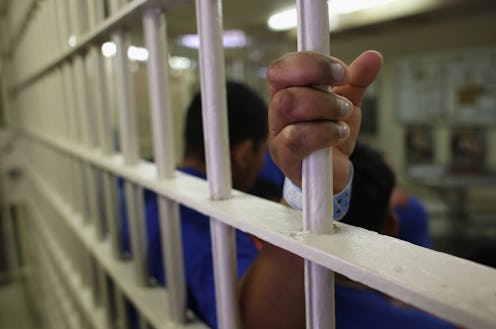News
The 5 Most WTF Arrests of 2014, So Far
All over the world, people are finding themselves in Kafka-esque scenarios. Whether you're tweeting the wrong thing in Kuwait, a Christian convert in Iran, or a gay man in Nigeria, you're simply not safe from wrongful arrests in many countries. Unfortunately, many governments (including the United States) use their power to suppress, oppress, silence, and marginalize dissent. Arbitrary arrest and detention mean human rights organizations have their work cut out for them when it comes to keeping track of who gets chucked behind bars. But as a test of a government's stability and democracy, nothing else is quite as telling as who a government decides to arbitrarily arrest.
Here's our list of the top five most egregious arrests of 2014, so far:
1. In China, a Legal Scholar and Rights Activist was Arrested for...being a Rights Activist
On Sunday, China made the controversial decision of sentencing a legal scholar, Xu Zhiyong, to four years in prison. The Chinese government hasn't been too happy with Xu — the civic group he founded has challenged the government's policies toward minorities and pushed for government transparency. Seventeen other members of his group have also been arrested.
Writes the Wall Street Journal: "The moves are part of a wider crackdown on dissent in which authorities have detained scores of dissidents, introduced stricter controls online and taken steps to rein in domestic media."
2. In Egypt, This Guy Also Got Arrested for a Critical Tweet
Egypt's recently been the site of one arbitrary arrest after another after another. So it was hard to pick out just the one. Still, something about this just takes the cake: one of Egypt's most prominent liberal intellectuals was charged with "insulting the judiciary" after he criticized a court verdict which ruled against three American nonprofits that promote democracy.
"Verdict in case of foreign funding of CS [civil society] shocking, transparency lacking, facts undocumented & politicization evident," the professor tweeted. He was subsequently charged with a crime.
3. In Russia, An LGBT Activist was Arrested for Waving a Rainbow Flag
Considering Russia's sweeping anti-gay laws (and Putin's general ant-gay comments), we saw this coming for a while now. Somewhere around 500 miles north of Sochi, a Russian LGBT activist unfolded a rainbow pride flag during the Olympic torch relay. He was then allegedly tackled and taken to police headquarters by Olympic security personnel.
According to AmericaBlog, "While it appears that Pavel [the activist] was perhaps initially stopped by Olympic security for stepping onto the roadway ... he was then handed over to the police, and detained by them because of his political statement, his rainbow flag."
4. In Saudi Arabia, a Palestinian Poet was Arrested for Being An Atheist With Long Hair
A Palestinian poet raised in Saudi Arabia was arrested not once, but twice, for allegedly spreading "atheism" through is work. His first arrest came about five months ago, after a reader submitted a complaint accusing his poems of containing atheist ideas. He was arrested again on January 1, 2014, and although he's still holed up in a Saudi prison, he's at least now got an incensed following on social media.
5. In Kuwait, This Guy Got Arrested for "Insulting the Emir" in a Tweet
Five years in prison, and permanent exile. That's the sentence that was imposed on 30-year-old Abdullah Fairouz Abdullah Abd al-Kareem, on January 9, 2014. A member of the Kuwait Human Rights Society, he sent a couple of critical tweets which have since been deleted — such as, “Your Highness, as you have the right to hold accountable whoever abuses you, I have the right to hold accountable whoever verbally abuses me from your lodging at Dar Salwa” — and because prison sentences can be slapped on anyone who “objects to the rights and authorities of the emir or faults him,” Al-Kareem has ended up jailed.
"Kuwait has made clear through the recent string of cases that it is willing to trample on people’s rights to protect the emir from criticism. Kuwait should be calling a halt to its embarrassing campaign to silence dissent, not ramping it up with permanent exile orders", says Nadim Houry, deputy Middle East and North Africa director of Human Rights Watch.
